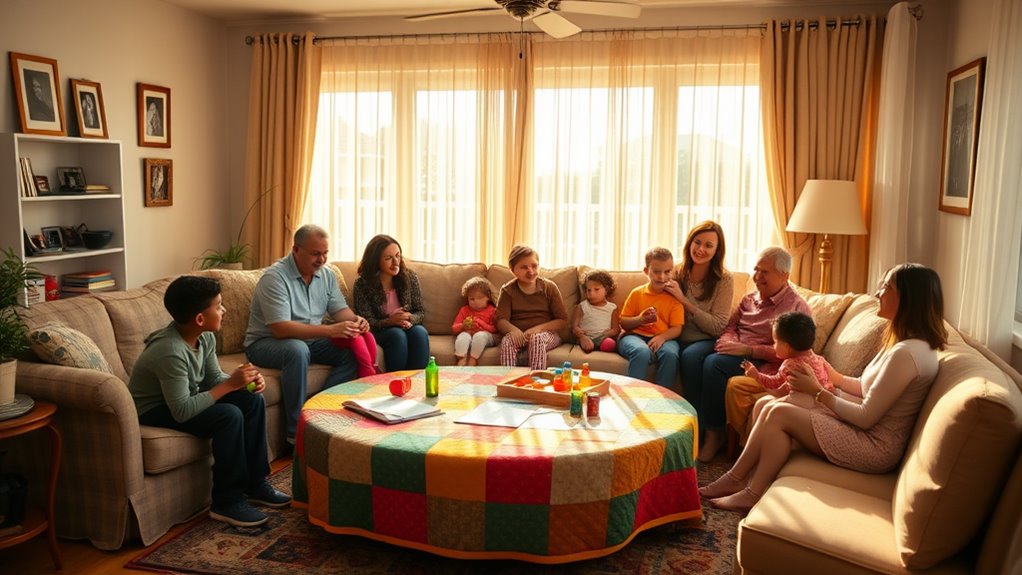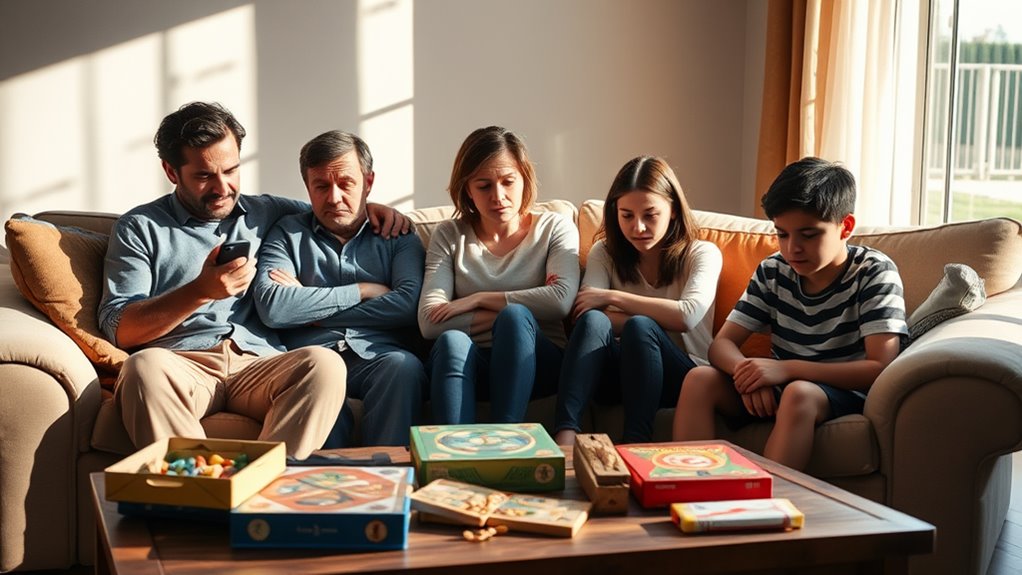Why Volunteering as a Family Creates Lifelong Bonds
Volunteering as a family creates lifelong bonds because it fosters shared experiences that deepen your relationships. When you work together on projects like community clean-ups or shelter shifts, you’re not just helping others; you’re building trust and emotional support among family members. These activities spark discussions about values and enhance empathy, while the challenges you face encourage teamwork and respect for each other’s strengths. The memories you create become cherished stories that you’ll share for years, strengthening your family narrative. If you explore further, you’ll discover even more ways volunteering enriches your connections and family life.
Key Takeaways
- Volunteering together fosters shared experiences, deepening emotional connections and strengthening family relationships.
- Overcoming challenges as a team enhances trust and support among family members.
- Collaborative projects promote effective communication and respect for each other’s strengths, building teamwork skills.
- Engaging in community service instills shared values like compassion and responsibility, shaping family dynamics.
- Creating memorable moments during volunteer activities fosters lasting bonds and cherished family traditions.
Strengthening Family Connections
Volunteering as a family can significantly strengthen your connections with one another. When you engage in meaningful activities together, you create shared experiences that foster deeper relationships. Whether it’s helping at a local shelter, participating in a community clean-up, or organizing food drives, these moments allow you to bond over a common purpose.
By working side by side, you’re not just contributing to a cause; you’re also building emotional support within your family. You’ll find that overcoming challenges together—like facing inclement weather or navigating tough tasks—can bring you closer. It’s during these times that you learn to rely on each other, reinforcing trust and understanding.
Moreover, volunteering often opens up discussions about values and beliefs, allowing for richer conversations about what matters most to each family member. This exchange of ideas strengthens connections and nurtures empathy, as you gain insight into one another’s perspectives.
Ultimately, the memories you create through volunteering will become cherished stories you can share for years to come. By investing time in helping others, you’re also investing in your family, cultivating a support system that can weather any storm.
Building Teamwork Skills
When you tackle volunteer projects as a family, you naturally develop teamwork skills that are essential in many areas of life. Engaging in collaborative projects helps everyone learn to communicate effectively and share responsibilities. Each family member brings unique strengths to the table, fostering an environment where everyone’s contributions are valued. This shared experience not only enhances your ability to work together but also builds trust among family members.
As you face challenges during your volunteering, you’ll find yourselves engaged in problem solving as a team. Whether it’s organizing an event or overcoming unexpected obstacles, you’ll learn how to brainstorm solutions collectively. This process teaches you to listen, respect differing opinions, and compromise when necessary—skills that are invaluable both at home and in the wider community.
Moreover, the practice of working together on a common goal helps create a sense of belonging and unity. You’ll discover that by supporting one another, you can tackle even the toughest tasks.
The teamwork skills you cultivate through volunteering as a family won’t only strengthen your bonds but also prepare you for future challenges in life, ensuring you’re ready to face them together.
Instilling Shared Values
Working together on volunteer projects not only strengthens teamwork but also helps instill shared values within your family. When you engage in community service as a unit, you naturally align your values around compassion, empathy, and responsibility. This value alignment can significantly shape your family’s identity and purpose.
As you tackle challenges together, you discuss what matters most, reinforcing lessons of kindness and giving back. These shared experiences become part of your family traditions, making values tangible through action. For instance, if you regularly volunteer at a local food bank, it not only teaches your kids about generosity but also creates a tradition that emphasizes the importance of helping others.
Over time, these shared values will influence your family’s dynamics and decision-making. You’ll find that the principles instilled during these volunteer projects extend beyond the activities themselves, becoming the bedrock of your family’s identity.
It’s about more than just the act of volunteering; it’s about creating a shared ethos that can guide your family as it grows. By nurturing these values, you’re equipping your children with a moral compass that lasts a lifetime.
Creating Lasting Memories
As you engage in volunteer activities together, you create lasting memories that strengthen your family’s bond. These shared experiences become the foundation of memorable adventures that you’ll cherish for years to come.
Whether you’re serving meals at a local shelter, cleaning up a park, or participating in a charity run, each moment spent together brings you closer.
Think of the laughter you’ll share while sorting donations or the sense of accomplishment after completing a project as a team. These activities provide opportunities to connect on a deeper level, allowing you to learn more about each other’s strengths and interests.
You’ll discover the unique ways each family member contributes, fostering appreciation and respect for one another.
Moreover, reflecting on these experiences can spark conversations about the impact of your efforts, reinforcing the values you hold dear.
From the little mishaps that turn into inside jokes to the heartfelt conversations that arise during quiet moments, these memories shape your family’s story.
Encouraging Open Communication
Volunteering together not only creates cherished memories but also opens up avenues for open communication within your family. When you engage in meaningful activities, it gives everyone a chance to share their thoughts and feelings in a relaxed environment.
This shared experience fosters active listening, where family members truly hear each other, leading to deeper connections.
Here are a few ways volunteering encourages this essential communication:
-
Safe Space: Being involved in community service creates a non-judgmental environment where everyone feels safe to express feelings.
-
Shared Goals: Working toward a common objective helps family members discuss their motivations and concerns openly.
-
Problem-Solving: Facing challenges together during volunteer work provides opportunities for constructive dialogue and collaboration.
-
Reflection Time: After volunteering, use moments to reflect on the experience, allowing each person to articulate their thoughts and feelings.
Fostering Community Engagement
How can families truly make a difference in their communities? One powerful way is through community involvement. When you and your family participate in local initiatives, you not only contribute to a cause but also set an example for others.
Volunteering together helps cultivate a sense of responsibility and pride in your neighborhood, reinforcing the idea that collective efforts can lead to meaningful change.
Engaging in community projects, whether it’s cleaning up a park or helping at a food bank, allows your family to witness the direct impact of your efforts. This hands-on experience fosters a deeper understanding of social issues and encourages empathy among family members.
You’ll find that the more you engage, the more connected you feel to those around you.
The family impact of volunteering stretches beyond immediate benefits; it creates a legacy of service that can inspire future generations. As your family bonds over shared experiences, you’ll create lasting memories and strengthen your ties to each other and your community.
Ultimately, fostering community engagement as a family not only enriches your lives but also builds a stronger, more connected community for everyone.
Frequently Asked Questions
What Types of Volunteering Activities Are Best for Families?
When considering volunteering activities, community gardens and animal shelters are perfect for families. You’ll learn teamwork, responsibility, and compassion, making it a rewarding experience that strengthens your family’s connection while giving back to others.
How Can We Find Volunteer Opportunities in Our Area?
To find volunteer opportunities in your area, check community resources like libraries, schools, and local organizations. While online searches can be helpful, personal connections often lead to unique, meaningful opportunities you might not discover otherwise.
What Age Groups Are Suitable for Family Volunteering?
Family volunteering’s suitable for all ages! Toddlers can participate in simple activities like park cleanups, while seniors can engage in mentoring or community service projects. Everyone can contribute, making it a rewarding experience for all involved.
How Can We Balance Volunteering With Our Busy Schedules?
You’d think balancing volunteering with life’s chaos is impossible! But with smart time management and clear family priorities, you can carve out meaningful moments. Schedule together, prioritize, and watch how rewarding it becomes!
What Are the Long-Term Benefits of Family Volunteering?
Family volunteering offers long-term benefits like stronger connections through shared experiences. You’ll not only make a positive community impact but also create lasting memories, fostering empathy and teamwork that enrich your family life for years to come.





